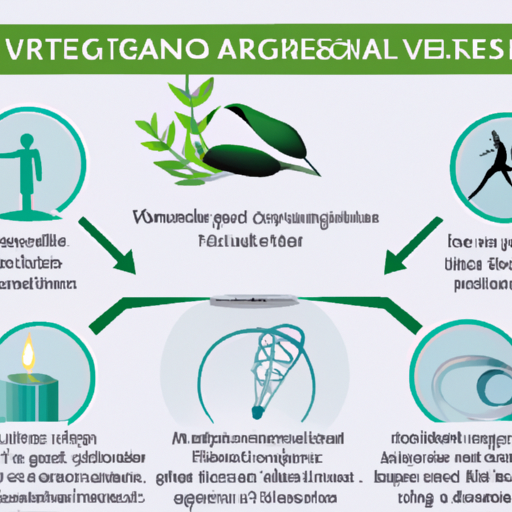Have you ever experienced that spinning sensation when you suddenly lose your balance and feel like the world is constantly spinning around you? Well, my friend, that’s called vertigo, and let me tell you, it’s no fun at all. But fear not, because in this article, we’re going to delve into some natural cures for vertigo that can help you find relief and get back to feeling like yourself again.
Now, before we dive in, let me make one thing clear – I’m not a doctor. So, always consult with a medical professional if you’re experiencing vertigo or any other health condition. That being said, there are some natural remedies that many people have found helpful in managing their vertigo symptoms. In this article, we’ll explore a few of them, including certain dietary changes, exercises, and herbal remedies. So, if you’re tired of feeling dizzy and disoriented, stick around and learn more about these natural cures for vertigo.
What is Vertigo?
Vertigo is a common symptom that refers to the sensation of spinning or dizziness. It is often described as a feeling of being off-balance or as if the world is spinning around you. Vertigo can be caused by various factors, including inner ear problems, certain medications, or a disruption in the normal functioning of the balance system in the brain.
Definition of Vertigo
Vertigo is different from dizziness, as it specifically refers to a spinning sensation. Dizziness, on the other hand, may include symptoms such as lightheadedness, unsteadiness, or a feeling of faintness. Vertigo can occur suddenly and may last for a few seconds or several hours, depending on the underlying cause.
Causes of Vertigo
Vertigo can be caused by a variety of factors, including:
-
Benign paroxysmal positional vertigo (BPPV): This occurs when tiny calcium crystals in the inner ear become dislodged and affect the balance organs.
-
Meniere’s disease: This is a chronic condition that affects the inner ear and leads to episodes of vertigo, hearing loss, and ringing in the ears.
-
Vestibular neuritis: This is an inflammation of the vestibular nerve, which connects the inner ear to the brain and is responsible for transmitting signals related to balance.
-
Certain medications: Some medications, such as those used to treat high blood pressure or anxiety, can cause side effects that include dizziness or vertigo.
-
Migraine: Some people experience vertigo as a symptom of migraine attacks.
-
Head injury or trauma: A blow to the head or injury to the ear can disrupt the normal functioning of the inner ear and lead to vertigo.
Medical Treatments for Vertigo
If you are experiencing vertigo, it is important to seek medical advice to determine the underlying cause and find an appropriate treatment plan. Medical treatments for vertigo can include medication and physical therapy.
Medication for Vertigo
Medications such as meclizine or diazepam may be prescribed to help reduce the symptoms of vertigo. These medications work by suppressing the signals from the inner ear that cause dizziness and spinning sensations. However, they may also have side effects such as drowsiness or blurred vision.
Physical Therapy for Vertigo
Physical therapy can be an effective treatment for certain types of vertigo, such as BPPV. A physical therapist can guide you through specific exercises and maneuvers that can help reposition the calcium crystals in the inner ear and alleviate vertigo symptoms.
Limitations of Medical Treatments
While medical treatments can be effective in managing vertigo symptoms, they also have certain limitations that should be considered.
Side Effects of Medication
Some medications used to treat vertigo may cause side effects such as drowsiness, dizziness, or blurred vision. These side effects can affect your daily activities and may not be suitable for everyone.
Cost of Medical Treatments
Medical treatments for vertigo, including medications and physical therapy, can be costly, especially if they need to be administered over a long period of time. This can be a significant barrier for individuals who do not have adequate health insurance coverage.
Lifestyle Changes to Reduce Vertigo
In addition to medical treatments, certain lifestyle changes can help reduce the frequency and severity of vertigo episodes.
Dietary Modifications
Making dietary modifications can help manage vertigo symptoms. It is recommended to avoid foods and beverages that can trigger vertigo, such as caffeine, alcohol, and foods high in salt, as these can affect fluid balance in the inner ear.
Exercise and Physical Activity
Engaging in regular exercise and physical activity can help improve balance and reduce the risk of vertigo episodes. Activities such as walking, swimming, or yoga can be beneficial in maintaining overall balance and coordination.
Natural Remedies for Vertigo
In addition to medical treatments and lifestyle changes, natural remedies can also be considered as an alternative approach to managing vertigo symptoms. Some natural remedies that have shown promise in relieving vertigo include:
Ginger
Ginger has been used for centuries as a natural remedy for various ailments, including nausea and dizziness. It is believed that ginger can help reduce inflammation and improve blood circulation, which may alleviate vertigo symptoms. Ginger can be consumed in various forms, such as fresh ginger root, ginger tea, or ginger supplements.
Vitamin D Supplements
Vitamin D deficiency has been linked to various health conditions, including balance disorders. Taking vitamin D supplements may help improve overall balance and reduce the risk of vertigo episodes. However, it is important to consult with a healthcare professional before starting any new supplement regimen.
Essential Oils
Certain essential oils, such as lavender or peppermint oil, have been used for their calming and soothing properties. Inhaling these oils or applying them topically may help relax the nervous system and alleviate vertigo symptoms. However, it is important to use essential oils with caution and follow proper dilution guidelines.
Benefits of Natural Remedies
Natural remedies for vertigo can offer several advantages compared to medical treatments.
Fewer Side Effects
Natural remedies, such as ginger or essential oils, often have fewer side effects compared to medications used to treat vertigo. This can make them a preferred option for individuals who are sensitive to certain medications or prefer a more holistic approach.
Affordability
Natural remedies are generally more affordable than medical treatments for vertigo. This can be particularly beneficial for individuals who do not have adequate health insurance coverage or have limited financial resources.
Home-based Exercises for Vertigo Relief
In addition to natural remedies, there are specific exercises that can be done at home to relieve vertigo symptoms.
Brandt-Daroff Exercise
The Brandt-Daroff exercise is a series of head and body movements that can help reposition the calcium crystals in the inner ear and improve balance. This exercise involves sitting upright, then quickly lying down on one side with the head turned towards the ceiling. After a few seconds, the person sits up again and repeats the process on the other side.
Epley Maneuver
The Epley maneuver is a technique used to treat BPPV. This exercise involves a series of head movements that aim to move the calcium crystals in the inner ear to a different location where they are less likely to cause vertigo. The Epley maneuver should be performed under the guidance of a healthcare professional.
Preventing Vertigo Episodes
Taking preventive measures can help reduce the occurrence of vertigo episodes. Some tips to prevent vertigo include:
Maintaining Hydration
Dehydration can contribute to vertigo symptoms, so it is important to drink enough water throughout the day and stay hydrated.
Avoiding Triggering Factors
Identifying and avoiding triggering factors that can worsen vertigo symptoms is crucial. These triggers can vary from person to person but may include certain foods, stress, lack of sleep, or specific movements.
Creating a Vertigo-friendly Environment
Making simple modifications to your environment can also help reduce the risk of vertigo episodes.
Improving Indoor Lighting
Proper indoor lighting can help improve visibility and reduce the risk of falls or accidents that can trigger vertigo. Ensure that rooms are well-lit and avoid dimly lit areas.
Removing Tripping Hazards
Removing tripping hazards, such as loose rugs or cluttered pathways, can help prevent falls and reduce the risk of injury or vertigo episodes.
Conclusion
Vertigo can be a challenging condition to manage, but there are various treatment options and lifestyle modifications that can help alleviate symptoms. While medical treatments can be effective, they may have limitations in terms of side effects and cost. Natural remedies, including ginger and essential oils, offer a holistic approach with potential benefits of fewer side effects and affordability. Additionally, home-based exercises such as the Brandt-Daroff exercise and Epley maneuver can provide relief from vertigo symptoms. By taking preventive measures and creating a vertigo-friendly environment, you can further reduce the occurrence of vertigo episodes. It is important to explore different approaches and find the right combination of treatments that work best for you in managing vertigo.


